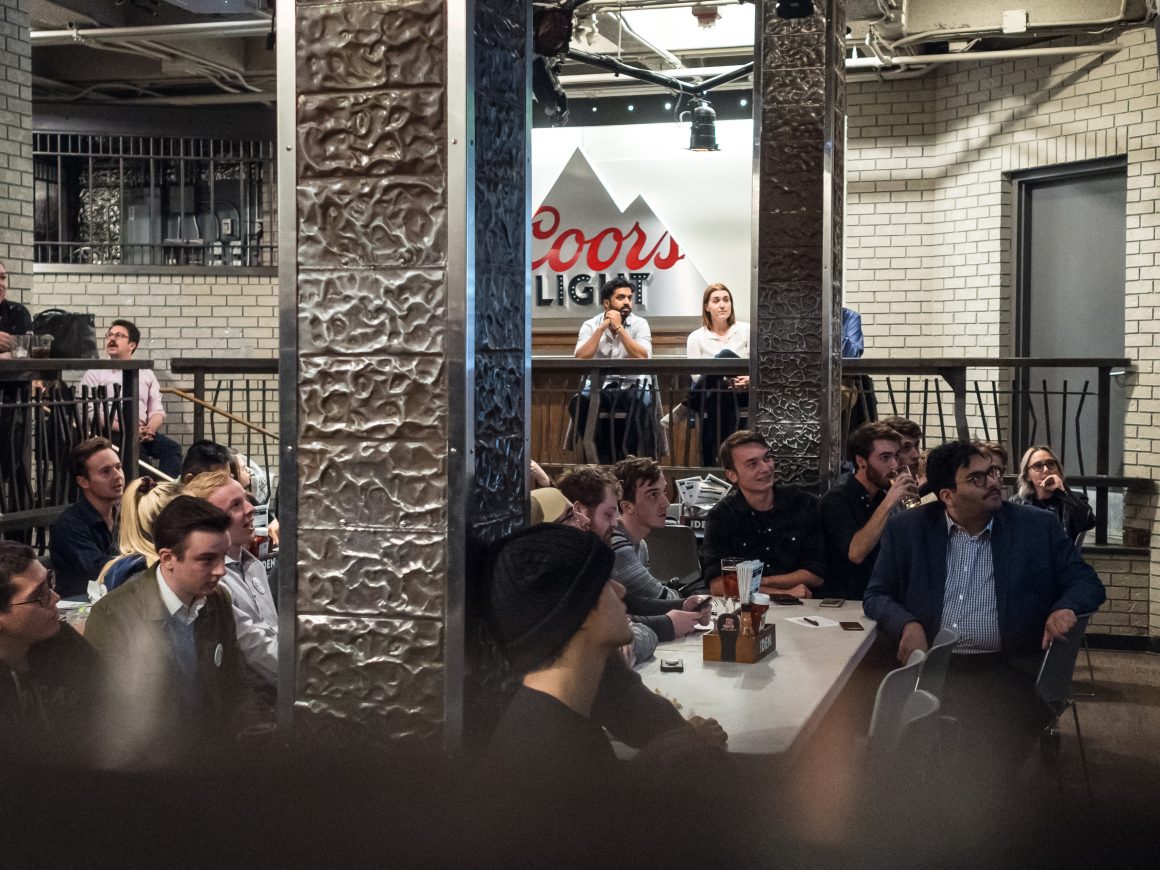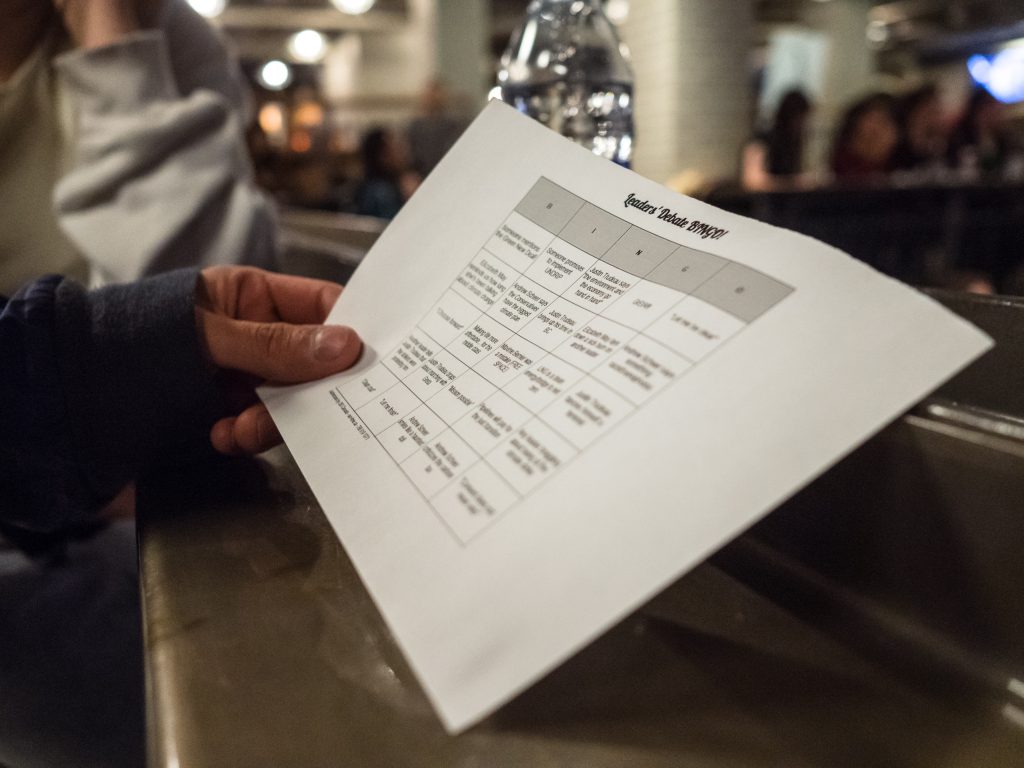
Jabs and jests: Federal leaders’ debate recap from The Den
By Nikayla Goddard October 8 2019 —
The English-language federal leaders’ debate watch party at The Den resulted in a turnout of an estimated 200 attendees. Hosted by the Students’ Union and the Gauntlet Publications Society, the watch party got as lively as the debate on the big screen, as viewers hooted and hollered to cheer on their candidates’ remarks.
The six candidates — Liberal leader Justin Trudeau, Conservative leader Andrew Scheer, NDP leader Jagmeet Singh, Bloc Québécois leader Yves-François Blanchet, Green Party leader Elizabeth May and People’s Party of Canada leader Maxime Bernier — were presented with five main themes: affordability and economic insecurity, national and global leadership, Indigenous issues, polarization, human rights and immigration and environment and energy.
Most of the watchers’ enthusiasm stemmed from the overwhelming amount of jabs that federal leaders took at each other, including Scheer’s response to the first question accusing Trudeau of being “a phoney and a fraud” and Singh’s attack on Bernier, saying to him “you don’t deserve a platform.”
A majority of the debate was spent taking shots and trying to talk over each other, a theme that moderator Dawna Friesen from Global News summed up succinctly following a debate between Scheer and Blanchet: “You’ve talked over each other and you’re both out of time.”
National and global leadership was the first topic, led by moderator Lisa LaFlamme from CTV News.
The first question focused on protecting Canadian interests and values in a changing world. Most candidates used this first question to talk generally about their platforms and take shots at other leaders rather than actually addressing the questions. Scheer’s remarks on Trudeau’s brownface and how Trudeau puts on many masks — including a feminist one — earned an elicit response from The Den crowd with both cheers and boos.
Bernier’s tweets referring to “diversity as a cult” were brought up next as a framework for asking whether he had the right temperament to be a federal leader. Bernier’s response was about the “truth” that Canada doesn’t need official multicultural acts and needs to take in fewer immigrants.
Singh debated Bernier on his answer, remarking how Bernier should have admitted he messed up when publishing those tweets rather than doubling down on them. Scheer combatted Bernier by accusing him of running a platform centered around tweeting when he remarked that he sought support “from the darkest corners of Twitter.”
“Leadership is service,” was May’s response to the question, also condemning Bernier’s crude tweets.
Trudeau’s response was that many leaders try to run on platforms of fear-mongering, which he said is what Bernier is trying to do. May agreed that rather than trying to divide and polarize, that everyone should stop arguing and work together.
Another hot debate followed when Singh asked Trudeau “Why do you keep letting down the people who voted for you?” arguing that Trudeau frequently condemns Harper’s government but is enacting similar policies and cutting similar areas as Harper.
Trudeau’s response focused on defending what the Liberals have done so far, talking about what the Liberals are going to do and slamming Scheer’s lack of released platform and saying how he will undo everything good the Liberals have done.
An open debate kept relative focus on the topic of climate change action, with May starting the discussion with how disappointed she is at the Liberals’ failing to meet their climate change targets and also purchasing a pipeline. Trudeau replied that their plan is the only one that is “ambitious and doable,” while Scheer said that the Conservatives would make the fight global, but also spoke of removing the carbon tax. The PPC wants to leave the Paris Agreement altogether.
The second segment was on polarization, human rights and immigration. It started off with moderator Althia Raj from Huffington Post Canada asking Singh about his stance on Bill 21.
Singh replied that he is against any law that is hurtful or discriminatory, and how the problem stems from the way people are being pitted against each other.
Trudeau responded that the federal government should intervene with Bill 21, countering that Singh isn’t doing enough against it.
Singh replied that “every single day of my life is challenging Bill 21” to applause. Scheer agreed and congratulated Singh on the way he handles racism.
Blanchet recollected how 70 per cent of Quebec supports Bill 21, so it’s “hardly a polarization issue in Quebec.”
Bernier remarked that it’s not the federal government’s place to intervene in any provincial politics, saying that “diversity of opinion” is something that Singh doesn’t understand.
“You don’t deserve a platform,” was Singh’s reply.

Bingo // Photo by Kristine Bravo
The next question surrounded how to make a unified vision for Canada and ensuring everyone has a voice.
Singh got to reply first and stated the main reason for polarization is that everyone is “worried about the future,” reiterating party platform points about how the NDP would change that.
May’s response was about restoring the idea of “real democracy” and getting rid of the first-past-the-post system in order to present a unified vision of government, rather than competing constantly.
Bernier’s response revolved around welcoming less immigrants.
Scheer had the chance to ask the next question, directing it to Trudeau about ethics. “When did you decide that the rules don’t apply to you?”
Trudeau responded with bashing the Conservatives for not having released any of their platform points yet and how it’s hard to know what Scheer is going to do.
Singh cut in by saying how it’s best to stop talking about who is worse, and instead focus on who will be the best leader for the country.
The third segment of the debate was on Indigenous issues, moderated by Susan Delacourt from the Toronto Star.
Scheer had the opportunity to respond first and replied that there is a balance between consulting Indigenous peoples and their treaty rights with the needs of the economy. How it’s about more than just ticking a box.
May had the opportunity for a rebuttal first and recalled how Harper violated a lot of Indigenous rights during his time, and how it’s about actually consulting Indigenous people, not continually negotiating and bullying them until they agree with you and you get what you want.
Blanchet piped in that most Québécois do not want a pipeline anyways, agreeing with May’s point about negotiations needing to be genuine.
Trudeau and Scheer got into an argument on who respects Indigenous rights the least — Trudeau saying that Conservatives have traditionally failed to respect their rights, while Scheer called out how Trudeau fired the first Indigenous governor general.
Another question was about how they would work with the provinces to acknowledge Indigenous rights. Notable responses came from May, who said we must fully consider all the recommendations that come from them and their boards, and Blanchet saying that we must treat them as a nation of their own and respect them in that manner.
The fourth segment was on affordability and economic security, moderated by Dawna Friesen from Global News. The first question was about reducing household debt and stepping away from the notion of borrowing to live.
May responded first with how the Green Party is the only party with a fully released platform and therefore a full idea of a budget, and outlined their plans to ban tuition and provide inexpensive child and health care among other things.
Blanchet said that cutting all subsidies to oil would play a role in the BQ budget, and May added that cutting all fossil fuel subsidies was the better option. May then called out Scheer and accusing him of having “short term, greedy, selfish policies” that benefit the rich and hurt the majority.
Other questions were responded to generally and pulled in other unrelated topics during efforts to squander other parties.
The final segment was moderated by Rosemary Barton from CBC News, and focused on the environment and energy.
Most of the conservation here fell to Trudeau. While his commitment to climate change in putting a price on pollution is progressing, May said it’s not a hard enough target. Singh criticized Trudeau for buying a pipeline despite his commitment to climate change action.
Bernier openly admitted that he believes there is no climate emergency and noted that the PPC will withdraw from the Paris Accord and slash the carbon tax.
The attention then turned to Scheer as Trudeau referenced the Conservatives’ “secret platform” once again, and brought up his plan to lower taxes for the rich. Singh said that Scheer’s tax cuts will result in many other problems of cuts then being made to education and health care. Scheer said those won’t be cut, and that most of the cuts would come from foreign budgets.
One of the more scathing comments came near the end of the debate with May saying that Scheer is not going to be Prime Minister, something she was willing to “lay bets” on.
While the debate touched on many important topics and the federal leaders were able to speak on a variety of election issues, a lot of time was spent slandering other leaders instead of answering the questions at hand. The debate reflects an election campaign that appears to be focused around sabotaging other leaders, rather than trying to promote themselves as the voice of the nation.
The leaders will get another chance to debate the most pressing issues of the election on Thursday, Oct. 10 from 6–8 p.m. for the French-language debate.
